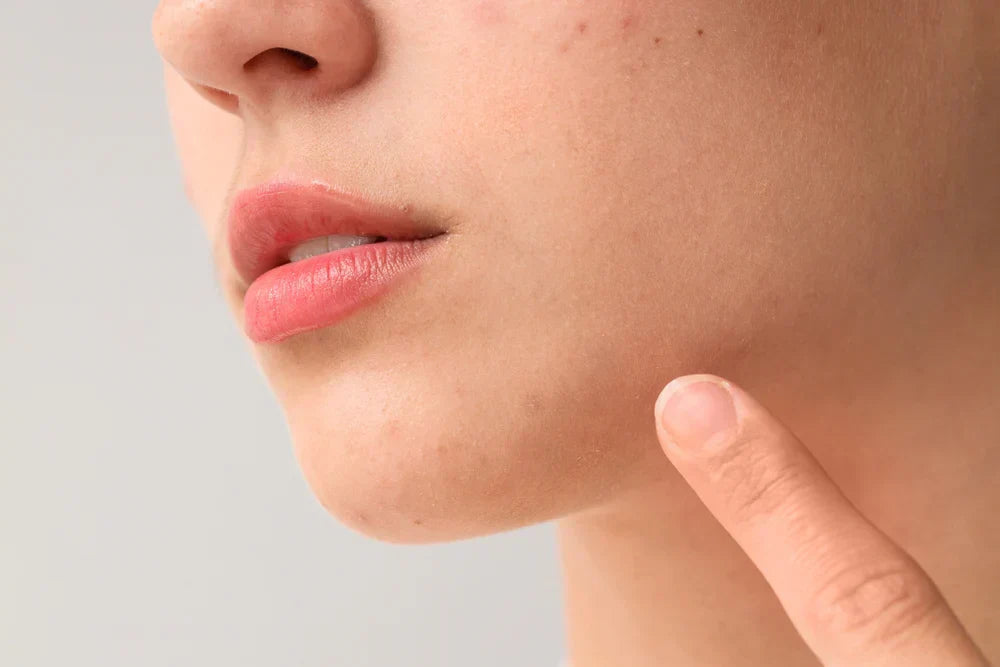
Are Cleansers Good for Acne?
Key Takeaways
-
The Cleanser's Role: A cleanser for acne is essential because it breaks down pore-clogging triggers without stripping the barrier, preventing irritation and rebound oil.
-
Targeted Actives: Effective formulas need actives like Salicylic Acid for clearing pores or Benzoyl Peroxide for killing bacteria, coupled with a gentle, non-comedogenic base.
-
Holistic Strategy: A cleanser alone is insufficient. It must be paired with targeted treatments and healthy lifestyle choices for truly effective, long-term results.
Acne management often starts with finding the right products, leading many people to ask: is a cleanser for acne actually effective, or could it just make things worse?
The truth is, choosing a targeted acne-prone cleanser is one of the most effective ways to control breakouts without stripping your skin. This article explains exactly what to look for in a cleanser for acne-prone skin and how to incorporate it into a routine for clear, healthy results.
Why Do You Need a Cleanser for Acne-Prone Skin?
Here's why using a cleanser for acne-prone skin is your first line of defence, addressing triggers that regular soap cannot:
-
Targets Core Triggers: Acne starts when sebum, dead cells, and dirt clog pores. A targeted cleanser for acne is formulated to effectively break down this pore-clogging buildup.
-
Maintains Skin Balance: Unlike harsh soaps, a dedicated cleanser removes impurities and makeup while maintaining the skin's pH, preventing moisture loss.
-
Prevents Oil Overproduction: Harsh cleansers strip the barrier, triggering the skin to produce more oil. A gentle acne cleanser stops this counterproductive cycle.
What Makes a Cleanser Good for Acne?
An effective acne-prone cleanser balances targeted actives with a protective formulation to treat breakouts and support the skin barrier. When searching for good cleansers for acne, focus on these features:
Active Ingredients with Specific Roles
The best cleansers feature potent ingredients that penetrate the pore:
-
Salicylic Acid: Oil-soluble and penetrates deep to exfoliate dead cells, dissolve clogs, and reduce inflammation.
-
Benzoyl Peroxide: Potent antibacterial agent that kills C. acnes and helps clear clogged pores.
-
Supporting Agents: Look for Niacinamide (reduces inflammation/controls sebum) or Glycolic Acid (surface exfoliation).
Gentle, Non-Comedogenic Formulation
The formula must avoid causing irritation or new clogs:
-
Non-Comedogenic: Must be designed not to block pores.
-
Barrier-Friendly: Cleansers must gently remove excess oil without stripping the protective lipid barrier, which prevents dryness and rebound oil production.
How to Choose the Right Cleanser for Acne-Prone Skin
Selecting the best cleanser for acne-prone skin is a personal process. Here’s how to match an acne-prone cleanser to your skin:
1. Match the Cleanser to Your Skin Type
The strength and texture must suit your skin:
-
Oily/Combination Skin: Look for foaming or gel formulas with Salicylic Acid (BHA) for deep pore cleaning and sebum control.
-
Dry/Sensitive Skin: Consider creamy, gentle, non-foaming cleansers. Choose lower concentrations of actives and prioritise soothing ingredients like ceramides.
2. Prioritise Safe and Effective Formulas
The product must treat acne without compromising your barrier:
-
Look for Key Actives: Use Benzoyl Peroxide washes for inflammatory acne; BHA is essential for general blackheads and whiteheads.
-
Avoid Harsh Ingredients: Always avoid cleansers with excessive alcohol or abrasive exfoliants, as these strip the barrier, causing irritation and rebound oil production.
3. Check for the Non-Negotiables
Confirm the product packaging states:
-
Non-Comedogenic: Guarantees the product is formulated not to clog pores.
-
Dermatologist-Tested: Provides assurance of tolerance for sensitive or reactive skin.
The Best Way to Use Your Acne Cleanser
Proper technique is essential to ensure your cleanser for acne treats effectively without irritation or rebound oiliness:
-
Prep Gently: Wash your hands, then wet your face with lukewarm water. Avoid hot water, which strips the skin.
-
Massage Thoroughly: Use a pea-sized amount. Gently massage onto damp skin with fingertips for 30 seconds to 1 minute. Focus on acne-prone areas.
-
Avoid Over-Cleansing: Cleanse strictly twice daily (AM/PM). Avoid scrubbing, which damages the barrier and triggers excess oil.
-
Rinse and Pat: Rinse completely with lukewarm water. Use a clean, soft towel to gently pat your skin dry to avoid friction.
-
Seal and Treat: Immediately follow with non-comedogenic acne treatments and a suitable moisturiser to maintain skin balance.
Can Cleansers Alone Prevent Acne?
Honestly, no, your cleanser is just the first step that preps the canvas. For effective acne management, you need a broader strategy that incorporates targeted leave-on treatments (like retinoids) and a healing moisturiser.
Tackling breakouts is holistic, meaning your dedicated skincare routine must also be paired with healthy habits, like managing stress and diet, to address all internal and external triggers.
The Ultimate Verdict on Acne Cleansers
Ultimately, a cleanser for acne is the non-negotiable first step, clearing the triggers and prepping your skin for success. However, for true control, you must pair it with targeted treatments and a gentle moisturiser; it's the full routine, not the single product, that clears breakouts.
Start building your complete, effective acne-prone cleanser routine today. Explore Shape Clinic's specialist-approved range of cleansers and treatments to find your perfect match.
Additional Reading
---
About the Author
Nicky Lurie is a skin therapist with over 20 years of experience, specialising in medical aesthetics. She supports both our surgical and aesthetic services by delivering customised skincare solutions using medical-grade treatments. Nicky’s expertise ensures clients receive effective, evidence-backed products tailored to their specific needs, from acne to ageing.
Products
View all
